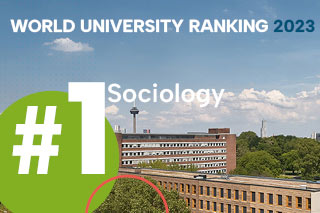The Faculty of Management, Economics and Social Sciences of the University of Cologne has again achieved excellent results in the Subject Ranking of the Academic Ranking of World Universities (ARWU, also known as the ‘Shanghai Ranking’). The subject of Sociology once again took first place in the "Global Ranking of Academic Subjects" (GRAS). In the subjects Management, Business Administration and Political Science, the University of Cologne also maintained its top positions.
The outcomes in detail: Cologne Sociology is ranked 1st nationally and 43rd internationally. In the Management Subject Ranking, the University of Cologne ranks 3rd along with the Frankfurt School of Finance & Management, the University of Hamburg, the University of Mannheim, and the University of Munich (201-300th position in the global standings). In the Business Administration ranking, the University of Cologne is ranked 4th nationally, along with Leuphana University Lüneburg, the University of Erlangen-Nuremberg (FAU), the University of Hamburg, and the University of Munich. Internationally, it ranks between 201 and 300.
In the subject of Political Science, the University of Cologne is rated fifth nationally, with a comparison to Humboldt University of Berlin, Technical University of Munich, and University of Mainz (internationally recognised as ranked 101-150). The Economics Department of the University is ranked fifth nationally this year, along with Goethe University Frankfurt, Humboldt University Berlin and Technische Universität München, and 151-200 internationally.
In the overall ARWU ranking, which was published on 15 August, the University of Cologne is ranked 6-9 nationally and 151-200 internationally. The Academic Ranking of World Universities (ARWU, resp. "Shanghai Ranking") is a global university ranking that has been released since 2003 and is published by the “ShanghaiRanking Consultancy”. Since 2009, the ShanghaiRanking Consultancy has published the Global Ranking of Academic Subjects (GRAS).
The ARWU Subject Ranking evaluates a total of 55 subjects from the natural sciences, engineering, life sciences, medicine and social sciences. Depending on the subject, the GRAS uses four to five indicators for the ranking, including the quality and scope of research, represented by citations, the number of publications in TOP journals, international collaboration and the prestige of the researchers, represented by significant research awards received (TOP Awards).
